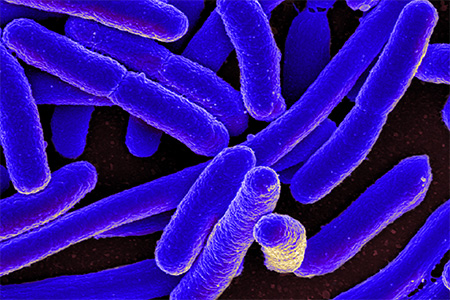
Two recent publications provide further evidence that the gut microbiota play a key role in disease progression, and additionally, the valuable role that germ free mice can play in helping to elucidate those key roles. In each study summarized below, mice with conventional gut flora and germ free mice were used. The first study published in
Laboratory Investigation on 28 July 2014 discusses how susceptibility to liver damage might be determined by your gut flora. In the second study published in
Nature on 17 September 2014 we learn that artificial sweeteners may cause glucose intolerance leading to metabolic disease.
Susceptibility to Acute Hepatic Injury Might be Determined by Your Microbiome
The list of pathologies impacted by the gut microbiota seems to get longer each day. It has been shown that the progression of chronic liver diseases is influenced by the intestinal flora, but now there are strong indications that this is also true for acute hepatic injury. Through a series of experiments with reconstituted
germ-free mice and co-housing of mice from different vendors, we could conclude, that the degree of acute liver injury in response to Concanavalin A challenge (an experimental liver injury model) was altered by the microbiome composition. As we were able to transfer the increased susceptibility to germ-free animals of a different genetic background by reconstituting them with the high-susceptibility flora, we could also conclude that it was not a strain specific effect. In investigating the underlying mechanism, the death receptor Fas response pathway was identified as an important component of the regulation mechanism exerted by the microbiome in this animal model. It will be interesting to see if these findings translates to humans as the gut microbiota then could become both a prognostic indicator and an indirect therapeutic target through which Fas sensitivity are regulated.
Artificial Sweeteners Induce Glucose Intolerance by Altering the Gut Microbiota
Artificial sweeteners are among the most widely used food additives worldwide, regularly consumed by lean and obese individuals alike. In the study, the scientists demonstrate that consuming commonly used artificial sweeteners can drive the development of glucose intolerance alterations to the intestinal microbiota. The harmful effects of the artificial sweeteners are fully transferrable to germ-free mice with fecal transplantation of microbiota from artificial sweetener-consuming mice, or of microbiota anaerobically incubated in the presence of artificial sweeteners. The authors identified artificial sweetener-altered microbial metabolic pathways that are linked to host susceptibility to metabolic disease. As an outcome of the study, the paper states "Collectively, our results link artificial sweetener consumption, dysbiosis and metabolic abnormalities, thereby calling for a reassessment of massive artificial sweetener usage." Numerous studies have been published implicating or linking microbiome dysbiosis to disease. Rodent models, and especially
germ-free models, will play an increasingly important role in conducting studies of the microbiome.
 Learn more about Taconic Biosciences' products or service supporting this field of research:
Learn more about Taconic Biosciences' products or service supporting this field of research:
 Two recent publications provide further evidence that the gut microbiota play a key role in disease progression, and additionally, the valuable role that germ free mice can play in helping to elucidate those key roles. In each study summarized below, mice with conventional gut flora and germ free mice were used. The first study published in Laboratory Investigation on 28 July 2014 discusses how susceptibility to liver damage might be determined by your gut flora. In the second study published in Nature on 17 September 2014 we learn that artificial sweeteners may cause glucose intolerance leading to metabolic disease.
Two recent publications provide further evidence that the gut microbiota play a key role in disease progression, and additionally, the valuable role that germ free mice can play in helping to elucidate those key roles. In each study summarized below, mice with conventional gut flora and germ free mice were used. The first study published in Laboratory Investigation on 28 July 2014 discusses how susceptibility to liver damage might be determined by your gut flora. In the second study published in Nature on 17 September 2014 we learn that artificial sweeteners may cause glucose intolerance leading to metabolic disease.
 Two recent publications provide further evidence that the gut microbiota play a key role in disease progression, and additionally, the valuable role that germ free mice can play in helping to elucidate those key roles. In each study summarized below, mice with conventional gut flora and germ free mice were used. The first study published in Laboratory Investigation on 28 July 2014 discusses how susceptibility to liver damage might be determined by your gut flora. In the second study published in Nature on 17 September 2014 we learn that artificial sweeteners may cause glucose intolerance leading to metabolic disease.
Two recent publications provide further evidence that the gut microbiota play a key role in disease progression, and additionally, the valuable role that germ free mice can play in helping to elucidate those key roles. In each study summarized below, mice with conventional gut flora and germ free mice were used. The first study published in Laboratory Investigation on 28 July 2014 discusses how susceptibility to liver damage might be determined by your gut flora. In the second study published in Nature on 17 September 2014 we learn that artificial sweeteners may cause glucose intolerance leading to metabolic disease.















.jpg)

.jpg)
.jpg)
.jpg)
.jpg)





.jpg)


.jpg)
.jpg)

.jpg)


.jpg)





.jpg)

.jpg)





